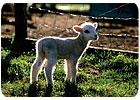
FDA may be poised to recommend that meat and milk from cloned animals be allowed to enter the food chain. At the very least, an agency study on cloned meat and dairy could spark a volatile debate just in time for the New Year.
A draft risk assessment and proposed risk management plan on animal clones, their offspring, and meat and milk from the animal could be released by the end of the year, FDA said last month. It would be followed by a comment period.
The agency spoke to the media after the Washington Post ran a story revealing a timeline and some details of the studies.
The move toward approval decision is based largely on new data indicating that milk and meat from cloned livestock and their offspring pose no unique risks to consumers.
"Our evaluation is that the food from cloned animals is as safe as the food we eat every day," said Stephen F. Sundlof, the FDA's chief of veterinary medicine, who has overseen the long-stalled risk assessment.
A number of religious, animal welfare, and consumer groups opposed to the marketing of products from cloned animals, including the Center for Food Safety in Washington, D.C., filed a petition last month asking FDA for a moratorium. IDFA is also opposed to allowing the products of cloned animals into the food chain at this time.
Issues of ethics and public acceptance could be quite serious, analysts say.
According to surveys, more than 60% of Americans don't embrace the idea of cloning animals to produce food.


